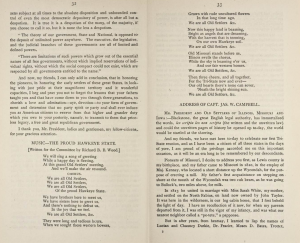As an Iowan growing up in a college town, Saturday football games were unavoidable. I’m from Ames which is home to the Iowa State Cyclones, and the biggest game of the year is when we play our in-state rivals the University of Iowa Hawkeyes. This last weekend was the biggest rivalry game yet, when some 160,000 extra people came to town just to celebrate and watch football. So when I went searching for a text that stood out to me, I was stopped in my tracks by the words written for a celebratory song called “The Proud Hawkeye State” by Richard B.B. Wood. I found the lyrics as part of an 1884 reunion for “The Tri-State Old Settlers’ Association of Illinois, Missouri, and Iowa”1 to be performed after a series of speeches celebrating what it meant to be an “Old Settler,” or in this case, someone who lived in one of the states prior to 1860 or who had been there for the last 25 years. Amid the triumphant chorus these lines stand out to me
They were long and tedious hours
When we sought these western bowers
Grown with rude uncultured flowers
In that time long ago
Now this happy land is beaming
Bright as angels that are dreaming
With the harvest that is teeming
On our own Hawkeye soil
Iowa became a state in 1846, only 38 years prior to the year the convention was held. While it is unclear, the general consensus by Iowa historians is that the “Hawkeye” nickname comes from fans of “The Last of the Mohicans” an 1826 novel by James Fenimore Cooper set during the French and Indian War in which “According to Cooper’s story, the Delaware Indians bestowed the name of “Hawkeye” upon a white scout and trapper, who lived and hunted with them, who also braved their perils in war against the Iroquois and Hurons.”2
It seems absurd but the nickname was bestowed by white Iowan newspaper men, inspired by a story by a white writer, in which Native Americans give a white man a Native American name. In Iowa, almost all of the Indigenous population was forcibly removed by the government by 19303, except for the Meskwaki Tribe which still exists to this day, so when this reunion was held there were likely attendees who were very familiar with this history.
In Dan Blim’s “MacDowell’s Vanishing Indians”4
Blim explores the concept of the “Vanishing Indian” as demonstrated in Edward MacDowell’s compositions. Blim explains that by creating art that claimed to eliminate any threat from Native Americans, Europeans could incorporate that imagined other into their cultural heritage, and that by establishing that Native American culture had “died,” it outlined white, European culture as something triumphant and unifying.
Similarly in these lyrics, Richard B.B. Wood celebrates “Old Settlers” as a powerful group of people who arose from some sort of tension to create a shining and glorious land on “their own Hawkeye soil.” However, while history is no doubt alluded to with racist coding like “rude uncultured flowers” these tribes are never named. The song is more about proving the excellence of the “Old Settlers” whose identity is literally grounded in economic prosperity tied to the richness of the land.
The act of singing a song meant to celebrate an identity in opposition to something is unifying. Anyone who cheers for a certain sports team can feel a sense of camaraderie with perfect strangers if they wear the same colors as us, hate the same people as us, and sing the same song as us. In the case of “The Proud Hawkeye State,” the team is the “Old Settlers” and the opponent is effectively unworthy of a name since it was defeated. “The Proud Hawkeye State” claims that something that once was “uncultured” has now been replaced to use a farming analogy as Iowans love to-do, it was uprooted.
1Tri-State Old Settlers’ Association of Illinois, Missouri, and Iowa. 1884-1887. Report of the first-[fourth] reunion of the Tri-State Old Settlers’ Association, of Illinois, Missouri and Iowa. Keokuk, Iowa: Tri-state Printing. Available through: Adam Matthew, Marlborough, American West.



I had no idea that the “Hawkeye” mascot/nickname derived from “Last of the Mohicans,” and I am so impressed by the thread you draw out from that source to the Old Settlers reunion to the University of Iowa fight song. (An even more “local” thread, at least while we’re on campus, is the link between the old text for “Fram! Fram! St. Olaf,” which until Professor Bobb edited it included a line about “raised for the race, a home in the west,” linking European settlement with a racial imperative.) It’s also fascinating to think that in 1884 Iowa was “settled” enough for “Old Settlers” to gather and invent a history that excluded Native Americans, while Francis Densmore’s collecting wouldn’t start for another decade. That helps put into perspective just how much violence and cultural loss transpired before the Bureau of American Ethnology started trying to preserve the cultural heritage of Native Americans. Sobering thoughts! Thanks so much for this post – looking forward to seeing what else you come up with this semester!